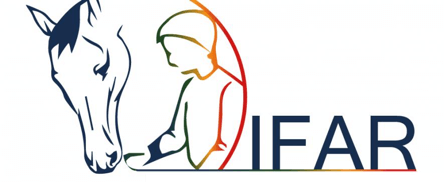The 2021 IFAR Conference, held virtually this year for the first time, closed April 27 with praise for the progress that racing has made in the realm of aftercare while acknowledging that continued work is necessary to address animal welfare concerns. Tuesday’s webinar was the last of four sessions that were held each Tuesday in April.
The final panel, “Aftercare for Racing Industry Participants: Owners, Breeders, and Trainers,” was moderated by media personality and aftercare advocate Francesca Cumani, who expertly led the discussion and provided rich insights based on her many years of training and handling horses.
Presenters were Dr. Mark Fisher, Kotare Bioethics Ltd, Wellington, New Zealand; Dr. Eliot Forbes, member, IFAR Steering Committee; Tom Reilly, chief executive officer, Thoroughbred Breeders Australia and Aushorse; and Dr. Christopher Riggs, director, Equine Welfare Research Foundation, and chief advisor, Veterinary Science, The Hong Kong Jockey Club.
Reilly talked about horse racing’s respected status in Australia but that the industry is still subject to intense criticism, as evidenced by the fallout of a 2019 investigative journalism piece that showed former racehorses being treated inhumanely at an abattoir. The Thoroughbred Aftercare Welfare Working Group was established with the support of industry stakeholders following that video, and the group will soon be releasing recommendations for the industry.
Reilly warned that while “Racing is well-accepted in society, there is a small subset in parliament that is opposed to it. The animal welfare lobby has proved to be incredibly effective.”
Fisher discussed the complexity of the animal welfare debate and that different people view an animal’s lived experience differently. He highlighted that perhaps the most important parts of animal welfare are enabling animals to be in their natural environment and ensuring that they are treated with dignity and respect.
Fisher cited that two ways of losing the animal welfare argument with the public are to be reactive rather than proactive and to shy away from building coalitions that include consumers and the public. Keys to public support are being transparent about welfare practices.
“Get your house in order and show it,” he said. “What sort of life do your animals have? How do we know? Can we trust you?”
Riggs’ presentation focused on the “one last race syndrome” – to squeeze one more race into a horse before retirement – and the risks associated with that mentality. He also warned of the impact of legal therapeutic medications because they can create a false sense of security as to the state of a horse’s joints and should be used judiciously. Riggs called for horsemen to consider all of these factors when contemplating that “one last start.”
Forbes spoke on the aftercare toolkit developed by IFAR, including supply- and demand-based strategies for promoting Thoroughbreds beyond the racetrack. He stressed that aftercare should be a priority for all stakeholders, and a comprehensive aftercare plan includes transition strategies, effective traceability measures, community engagement, advocacy of the Thoroughbred breed, and networking.
“We want to see aftercare structurally embedded in the racing business model of every country and in the heart of every racing participant,” said Forbes. “A caring industry will be a sustainable industry.”
Di Arbuthnot, chair of IFAR, closed the conference.
“We are delighted by the global reception to this year’s IFAR Conference,” said Arbuthnot. “All of our speakers and moderators offered valuable insights to share with our audience, and we are thankful for their participation and commitment to aftercare.
“The wide range of viewers who tuned into each of IFAR’s sessions indicates the interest from the Thoroughbred industry in prioritizing aftercare on a global scale, and the IFAR team is here to assist jurisdictions who wish to develop or enhance their programs.”
Recordings of all four sessions of the 2021 IFAR Conference can be viewed at internationalracehorseaftercare.com/help-resources/conference-resources/ifar-conference-2021/.
IFAR has previously been held in conjunction with the Asian Racing Conference in Cape Town, South Africa, in February 2020; the European & Mediterranean Horseracing Federation’s General Assembly in Oslo, Norway, in May 2019; the Asian Racing Conference in Seoul, South Korea, in May 2018; and the Pan American Conference in Washington, D.C., in May 2017.
IFAR is an independent forum that recognizes geographical and industry differences among racing countries and is designed to enhance Thoroughbred aftercare worldwide. Working with the International Federation of Horseracing Authorities, IFAR will raise awareness of the importance of welfare for Thoroughbreds, improve education on lifetime care, and help increase demand for former racehorses in other equestrian sports. For more information on IFAR, visit internationalracehorseaftercare.com.
